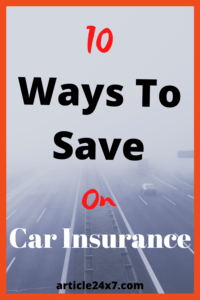First Published: 22 July 2020
Car Insurance
There are many ways to save on car insurance to reduce your premiums without giving up coverage. One of the easiest things to do is get auto insurance rate quotes online. This will allow you to do comparative shop stress-free.
When shopping for car insurance, take your time and research thoroughly. For most people, car insurance is one of the largest insurance expense the have to make after house purchase and health insurance. Rates are high and are forever climbing, at least it seems that way. You can save money on your car insurance premiums by following these easy to put in place steps.
1. Shop Around. Yes, it pays to shop and compare for your car insurance quotes. Get many quotes as you can. Get at least three different quotes from 3 different insurance companies. One from a comparable site on the internet to get an auto insurance rate quote online. A second from your current agent and a third from an independent agent over the phone. This will allow you to compare without too much stress.
2. Raise Your Deductible. A $200 deductible sounds wise until you learn that the cost for having a deductible at this threshold can drive your rates through the roof. Consider a deductible as high as $1000 to save on premiums. You can always fix minor mishaps on your own. By choosing a higher deductible, you can reduce your premium cost.
Increasing your deductibles is the easiest way to reduce your premium. The higher the deductible, the lower your premium will be. A deductible is the part of the premium you pay in the event of an accident, before the insurance company coverage steps in.
Make sure that the deductible that you carry is available to you in a deposit account. Don’t carry more than you can pay. In an event of an accident, an insurance company will not honour their part of the agreement until you’ve paid your excess.

3. Drop Collision. If your automobile is worth less than two or three thousand dollars, consider dropping collision altogether.
Sure, you will get nothing from your insurer if your car runoff. but repairable. The savings you make from dropping collision can be used as a down payment for your next car.
If the car is old and not very valuable, comprehensive insurance is not worth buying as it can add up to more than you’d ever receive in the event of an accident. You can save up to 20% by eliminating collision insurance.
4. Look for Discounts. If your car has certain safety features, make sure that your insurer is aware of this. Older cars, that do not have airbags would carry a higher premium. But, if you have a model that has airbags, you will save money on your insurance.
5. Business Deduction. If you drive your car for business, a part of your insurance costs may be deductible. The rates that you pay may be increased if your insurer knows that you use your car more for business than pleasure.
Related articles:
Good Business Travel Insurance For A Worry Free Trip
Travel Insurance For A Serene Vacation In Canada
How To Avoid Financial Crisis And Prepare For The Coronavirus Outbreak
How To Budget For Financial Independence
6. Combine Policies. Buy your homeowners, auto, and life insurance policies from the same broker and you may save on your premiums. Some insurance companies reward policyholders if they “one-stop” buy all their insurance needs through one company.
7. Consider Before You Buy. The BMW 4 Series Convertible may be your ideal car, but it could also raise your insurance rates. A less sporty model would be ideal. The type of car you drive can also reduce your rates.
Stay away from cars that have a high-class rating. Rates vary among the different makes and models of vehicles. The different rates are based on the risk of accident, the cost to repair, higher theft rates for a model and replacement costs such as with a new vehicle. So be sure your vehicle isn’t going to be in a category that increases your rates too much.

8. Drivers Ed Course. You may have taken a driver’s education course and your insurance company has not factored that in when determining your premium. Let them know that you are a safe driver! A safe driving record consisting of no accidents and no traffic violations will get you the most substantial discount.
Most insurance companies are very good at recognizing good driving habits. These are the drivers they want to insure because their risk is much lower. See if you qualify for a Better Driver pre,iu, discount too.
9. Deleted Points. If you had moving violations that were reported to your insurance company, make sure that your insurer adjusts your premium downward if several years have gone by since the occurrence. You could be paying a premium higher than you deserve.
10. Check Your Policy. If the insurer has the wrong address, town or zip code on your policy, you could find yourself paying more than you should. It makes sense to complete a car insurance check, the easiest way is to run an insurance check on your vehicle on the Motor Insurers Database.
Reducing your car insurance costs should not be an impossible feat. By following these steps, you should realize some savings the next time your policy comes up for annual renewal
Car insurance will vary depending on the insurance agency, your driving record, and the type of insurance you are looking to buy
Always remember that the lowest or cheapest car insurance is not always the best option. Make sure you choose a reputable company with an exemplary service who are available 24/7 to answer your queries.
FAQ’s
How Can I Make My Car Insurance Cheaper?
To lower your car insurance costs, try the following approaches:
Compare Rates: Get quotes from multiple insurers to find the best deal that offers both good coverage and a reasonable price.
Raise Your Deductible: Opting for a higher deductible can reduce your premium, but ensure you have funds set aside in case of a claim.
Bundle Your Insurance: If you have other types of insurance like home or renter’s insurance, bundling them with the same provider can lead to discounts.
Maintain Good Credit: Many insurers use credit scores to determine rates, so improving your credit can lead to lower premiums.
Practice Safe Driving: A clean driving record with no accidents or tickets can qualify you for safe-driver discounts.
Consider Pay-Per-Mile Plans: Some insurers offer plans based on how much and how safely you drive, which can lower your rates if you drive infrequently.
What Are the Must-Haves in a Car Insurance Policy?
When choosing car insurance, consider including these essential coverages:
- Liability Insurance: Required in most areas, it covers damages or injuries you cause to others in an accident.
- Collision Insurance: This covers the repair or replacement of your vehicle after an accident, even if you’re at fault.
- Comprehensive Insurance: Protects against damage to your car from non-collision events like theft, weather, or vandalism.
- Uninsured/Underinsured Motorist Coverage: Ensures you’re protected if you’re hit by a driver who doesn’t have sufficient insurance.
- Roadside Assistance: Provides help in emergencies such as flat tires, battery issues, or needing a tow.
- Rental Reimbursement: Covers the cost of renting a vehicle while yours is being repaired after an accident.
How Can I Save Money on My First Car Insurance?
For first-time buyers, here are ways to reduce your car insurance costs:
Choose a Safe Car: Vehicles with good safety ratings often qualify for lower insurance premiums.
Take a Defensive Driving Course: Completing a certified driving course can earn you discounts with many insurers.
Start with Basic Coverage: Opt for the minimum required insurance to begin with, and you can upgrade as needed over time.
Look for Discounts: Many companies offer discounts for students, low-mileage drivers, or those bundling multiple policies.
Join a Parent’s Policy: Young drivers typically save money by being added to a family insurance policy.
Drive Safely: Keeping a clean driving record from the start will help ensure lower rates in the future.
How to Get Cheaper Car Insurance for 18-Year-Olds?
Car insurance for young drivers can be expensive, but these tips can help reduce the costs:
Stay on a Parent’s Policy: This is often more affordable than getting a separate policy.
Take Advantage of Discounts: Look for discounts available to young drivers, such as those for being a good student or driving a limited number of miles.
Drive an Affordable Vehicle: Choosing an older or less expensive car can significantly lower insurance premiums.
Complete a Driving Course: Many insurers provide discounts if you’ve completed a defensive driving course.
Limit Coverage for Older Cars: Dropping collision and comprehensive coverage on older vehicles can save money.
Shop Around: Always compare quotes from different insurance companies to find the best deal for young drivers.

